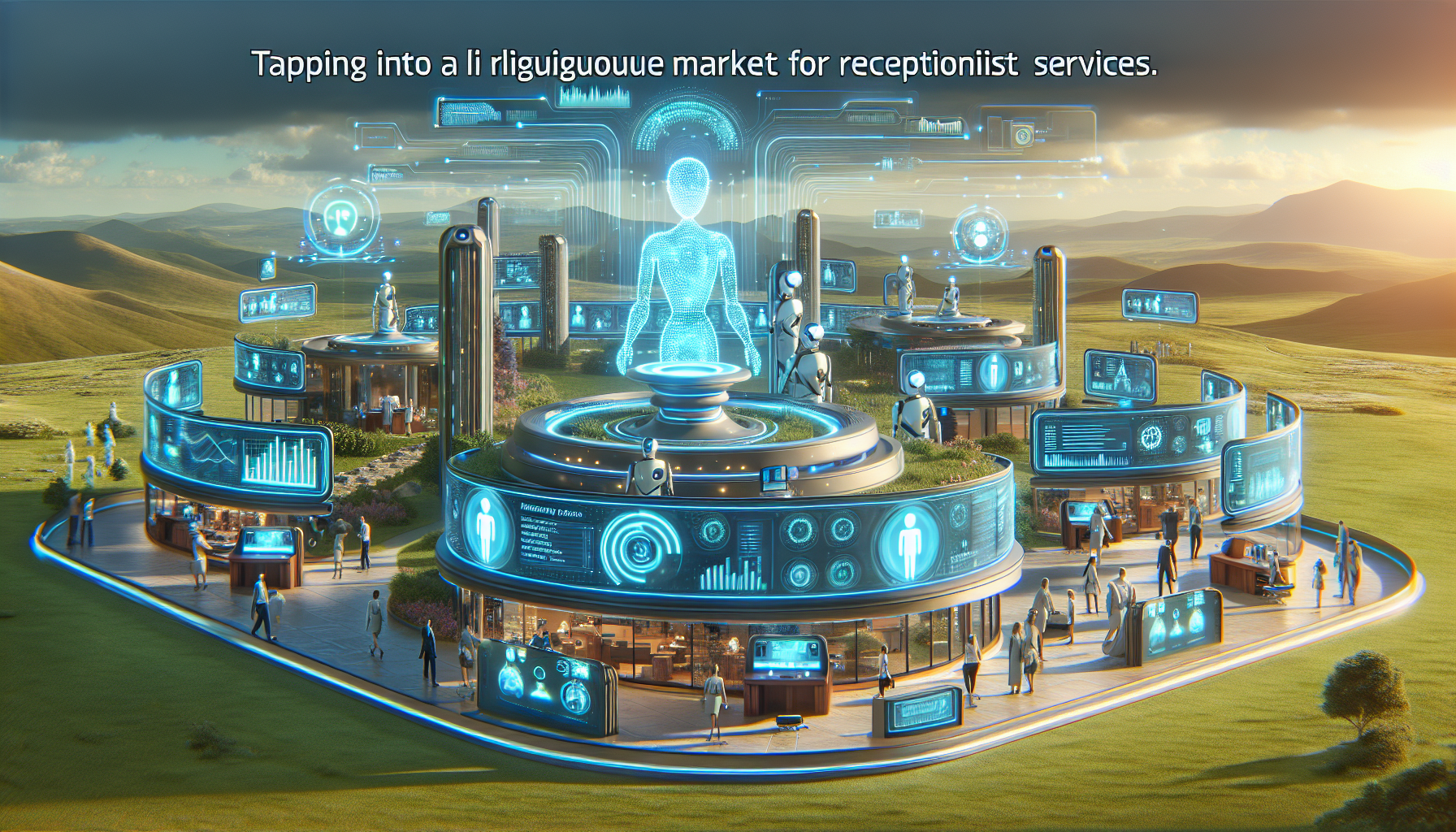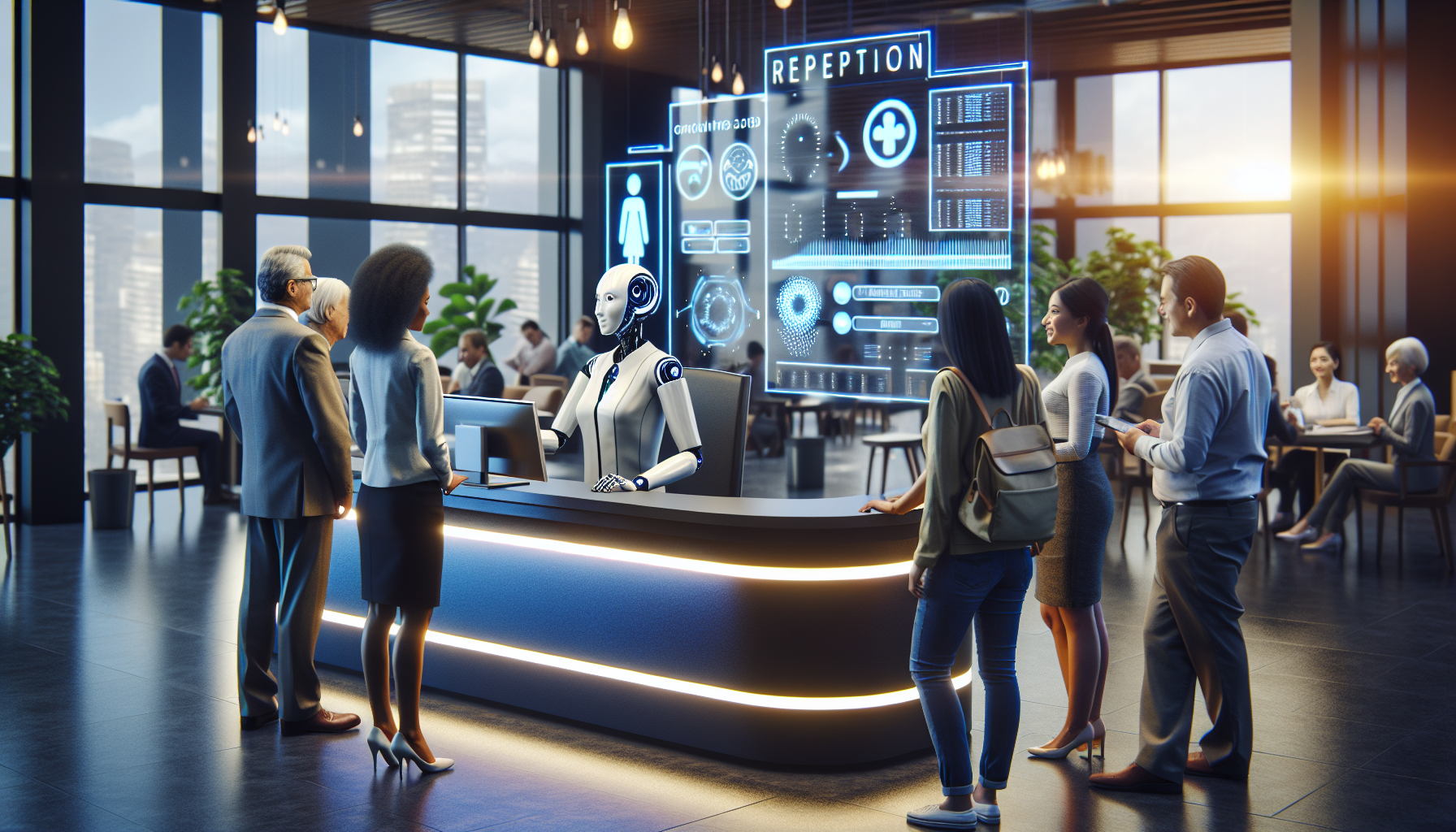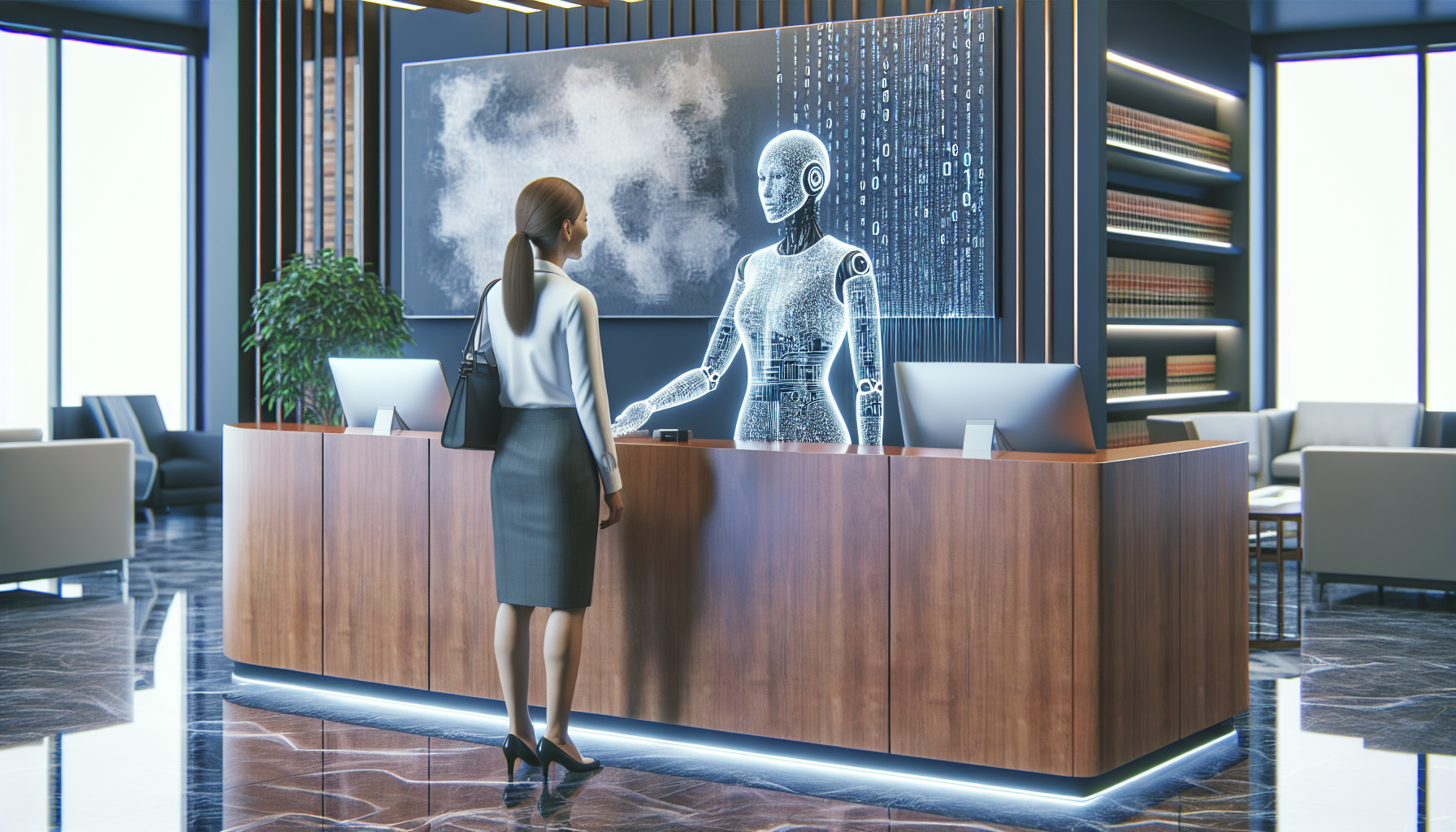
Innovative technology has been reshaping various industries worldwide, and the legal field is no exception. Among the potent tools being adopted are AI receptionists, digital platforms that offer a range of benefits personally tailored to legal firms' distinct needs. These AI-enabled assistants are opening up a new lucrative market for receptionist services set to revolutionize the way law firms operate.
AI receptionists, or Artificially Intelligent Receptionists, use cutting-edge technology to automate many of the tasks traditionally undertaken by human receptionists. Far from being impersonal or less effective, AI receptionists have proven to provide efficient, reliable, and cost-effective solutions for law firms, thanks to their unlimited capacity to handle multiple tasks at once and their 24/7 availability.
For legal firms, where time is not only a precious resource but often equated with money, AI receptionists’ ability to streamline operations while reliably handling calls and scheduling appointments is a game-changer. Furthermore, these digital platforms are capable of transcribing and storing calls, tasks that add to the panoply of compliance demands often challenging to meet.

The adoption of AI receptionist services not only grants law firms the undeniable benefits of increased efficiency and cost reduction. Still, it also provides them with an opportunity to differentiate themselves within a highly competitive market by offering clients unprecedented availability and responsiveness.
These technologies are poised to become increasingly prevalent as legal firms continue to realize their potential. With the advent of AI receptionist services, we can expect to see a significant evolution in the way law firms function, with incredible benefits for both the firms and their clientele.
The rise of Artificial Intelligence (AI) has brought a paradigm shift across various industries and the legal sector is no exception. The demand for AI-driven receptionist services within the legal sector has notably surged as firms seek more efficient ways to manage their operations and drive growth.
A recent Legal Futures report revealed that the demand for AI in law firms increased by a third in the past year. Specifically, many legal firms are showing keen interest in automated receptionist services. Recognizing the immense value that a receptionist brings in client service and internal operations, legal firms want to preserve this role while enhancing its efficiency through AI.
Take the case of client calls—an area where AI receptionists can greatly excel. Traditional human receptionists may struggle with handling the volume of incoming calls, tracking important details, or ensuring 24/7 availability. On the other hand, AI receptionists offer a solution, leveraging machine learning algorithms and natural language processing to handle multiple calls, route them to the right person or department, and even offer basic legal advice.
Deloitte’s study on "2021 Millennial and Gen Z Survey" highlighted that both these consumer segments have high expectations for the digitization of services. Given that millennials and Gen Z form a big chunk of today's consumers, it is incumbent upon law firms to adjust to these expectations. Therefore, implementation of AI receptionist services is not just a technologically innovative move, but also a strategically brilliant one to stay relevant in the market.
Looking at the market dynamics, expert forecasts, such as the Grand View Research, project that the AI market will continue its bullish trend, hitting $733.6 billion by 2027. A large share of this growth will be driven by AI-enabled services like AI receptionists.
In conclusion, the market for AI receptionists in the legal sector is rich with potential. As AI continues to evolve and mature, so too will the opportunities for law firms to bolster their operations while delivering superior customer service, thereby proving the lucrative nature of this market.
In the rapidly evolving legal ecosystem, many legal firms are choosing to pivot toward digital solutions and Artificial Intelligence (AI) to increase their operational efficiency. Among the myriad of possibilities AI offers, one of the most groundbreaking has been AI-driven receptionist services. These virtual entities, programmed to handle receptionist duties, present a cornucopia of benefits for busy legal firms.

The most prominent advantage of having an AI receptionist is their 24/7 availability. Unlike human receptionists who might need breaks or may not be available after work hours, AI receptionists are on hand around the clock. This service standard is not only practical but also creates a warm, responsive interaction for clients possibly dealing with urgent legal matters. Studies have shown that legal firms offering prompt, day-and-night access improve their client retention rates.
Serving clients from different nationalities can often pose a language barrier. However, an AI receptionist offering bilingual or even multilingual support can effortlessly serve clients in their preferred language. This feature not only builds a friendly rapport but also helps the legal firm position itself as an inclusive, global entity.
Furthermore, AI receptionists can greatly enhance the efficiency of client services. By intelligently sorting calls, drafting emails, scheduling appointments, and addressing queries, these systems can drastically reduce the workload of legal professionals. This, in turn, allows them to focus more on their core tasks, rather than administrative ones, thereby enhancing the performance of the firm. An AI receptionist can effectively streamline the workflow, as indicated in a report on advancements in legal technology.
In conclusion, AI receptionists are a lucrative investment for legal firms. Harnessing this modern solution equips companies with a new dimension of capabilities, presenting an advanced image to clients, and ultimately growing the bottom line.
As we stand on the precipice of the Fourth Industrial Revolution, the integration of artificial intelligence (AI) into legal practices becomes not just an innovative option, but rather a decisive step toward future-proofing operations. One such area ripe for AI implementation is receptionist services, a function where AI can augment human capacities, streamline workflows, and enhance client engagement. However, for legal firms seeking to tap into this lucrative market, certain strategies are critical for success.
The first and fundamental step is selection and adoption of the right AI technology. Gartner's research indicates that clarity about requirements and alignment with firm goals are crucial for successfully adopting AI. Incorporating AI receptionist services, whether it's chatbots or virtual assistants, should fundamentally align with the firm's strategy with respect to technology adoption and client service enhancement.
After firm decision making, staff training and onboarding follows. Firms need to invest in training their staff, ensuring they understand both the functionality and value proposition of the AI systems. Legal personnel should be trained to work synchronously with these AI-powered systems, enhancing their ability to handle more complex tasks while AI manages routine operations. It is also pivotal to instill an AI-first culture in the firm to promote use and continuous learning.
A noted trend among successful implementers of AI receptionist services among legal firms is the commitment to continuous assessment and improvement. It is important to remember that integrating AI is not a one-off process, but a constantly evolving journey. The AI receptionist services need continuous monitoring, feedback, and tuning to ensure maximal performance and client satisfaction. Maintenance and enhancement align with the principles of continuous learning and innovation, as suggested by McKinsey's research on barriers and adopters of AI.
In conclusion, while the market for AI receptionist services within legal firms is lucrative indeed, the potential for growth and profitability hinges directly on a firm's preparedness for and strategy in implementing and managing these technologies.
In today's technologically advanced world, numerous legal firms are finding success by integrating AI receptionist technologies into their practices. This technology, designed to automate administrative tasks and improve client services, has shown promising results in increasing efficiency and client satisfaction.

One noteworthy success story is that of Smith & Pools, a prominent law firm in the United States. They began incorporating AI receptionist services into their operations in late 2019. In less than a year, the firm reportedly experienced a 40% increase in efficiency in terms of handling appointment scheduling, answering client queries, and managing other administrative duties.
The Courtly Legal Group in the United Kingdom also harnessed the power of AI receptionist technologies. They opted for a comprehensive solution that integrated virtual receptionist capabilities with their existing client relationship management systems. The results were impressive; the firm saw a significant reduction in overhead costs and an increase in client retention rates, demonstrating the financial benefits of adopting this technology.
Down under, the Aurora Law Associates in Australia took AI receptionist implementation up a notch. They aimed to offer personalised client experience, driving their AI to learn and adapt depending on client behaviour and requirements. The result was a resounding success, with increased client satisfaction and a significant boost in firm reputation.
These success stories underscore the transformative potential of AI receptionist technologies in the legal domain. They highlight the importance of strategic implementation and the boost in efficiency, cost-saving, and client satisfaction that such technology can usher for forward-thinking legal firms.
As we delve deeper into the digital age, two landscapes that are witnessing rapid transformations are legal firms and Artificial Intelligence technology. More particularly, the advent of AI receptionist services for legal firms presents a lucrative prospect that promises efficiency, profitability, and modernization.
With AI technology becoming more advanced, future trends suggest a proliferation of highly intelligent legal chatbots and AI receptionists capable of performing complex tasks. These digital receptionists would potentially handle not just traditional receptionist duties, but also sort through legal documents, handle research, schedule appointments, and even conduct initial client meetings.
How might such changes impact the legal sector? For starters, these intelligent AI receptionists can further streamline operations in legal firms, freeing professionals from repetitive administrative tasks, thereby allowing them to concentrate more on their core practice areas. On the client front, AI receptionists can offer a higher degree of accuracy, promptness and availability thus ensuring better client satisfaction.
However, it's also crucial that as AI makes deeper inroads into the legal sphere, ethical and regulatory considerations be addressed. Concerns around data privacy, accuracy of AI interpretations, and its ability in fully understanding complex and context-dependent legal nuances should be met head-on.
We may also see a surge in alliances between AI technology providers and legal firms. Such collaborations would ensure that AI services are tailored to suit the unique demands of the legal market, offering personalized and bespoke AI receptionist services.
As we peek into this promising future, it's clear that legal firms that are quick to adapt to this technology stand to reap manifold benefits. Undeniably, AI receptionist technology is quickly transforming from a tech novelty to a standard practice in the world of legal firms.
Start your free trial for My AI Front Desk today, it takes minutes to setup!








